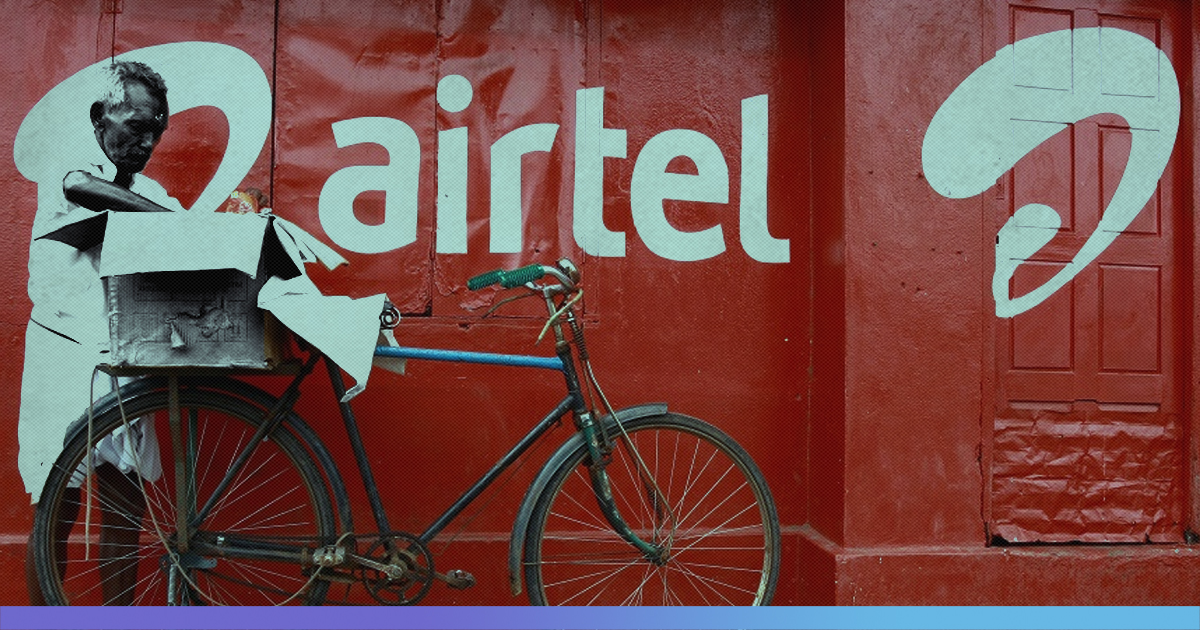
Bharti Airtel To Become Foreign Entity, Govt Policies Responsible?
Bharti Airtel’s promoter Bharti Telecom has sought the government’s approval for Foreign Direct Investment (FDI) infusion of Rs. 4900 crore from Singapore based Singtel, and other foreign-based entities, PTI reported. If approved, the country’s oldest private telecom service provider will become a foreign entity.
“Bharti Telecom has applied for infusion of Rs 4,900 crore in the company which includes investments from Singtel and some other foreign investors. With this Bharti Telecom will become a foreign entity as majority stake will be held by overseas investors. Department of Telecommunication (DoT) is expected to approve this investment this month,” an official source told PTI.
Around 41% of stakes of Bharti Airtel is held by Bharti Telecom whereas foreign promoters hold 21.46% stake in the company. Public shareholders hold around 37% stake.
Earlier this year the Department of Telecom (DoT) had rejected Bharti’s Telecom request for FDI, as the company had not provided clarity on the foreign investor.
Telecom Sector In Financial Stress
Bharti Airtel in the second quarter of FY’20 posted a net loss of Rs. 23,045 crore, due to provisioning of Rs. 28,450 crore after the Supreme Court’s (SC) October 24, 2019, ruling on AGR dues.
Interestingly, in the same quarter of the previous year, Bharti Airtel had posted a net profit of Rs.119 crore. Since the entry of Reliance Jio in 2016, the Indian telecom sector consolidated into only three private sector players — Jio, Airtel, and Vodafone Idea.
Bharti Airtel, in the process, experienced a decline in subscriber base from 345 million in 2018 to 281 million until June 2019. The net debt of the company stands at over Rs. 1,80,000 crore.
Now, with the additional burden of clearing AGR dues, the telecom sector companies — which were already under severe debt — will have to clear dues worth Rs. 1,47,000 crore with the DoT.
Call For Relief From Government
Post the ruling of the SC, the two companies — Airtel and Vodafone Idea — in their press release had requested the govt. to look for ways to curb the financial burden on the sector.
In response to the sector’s call for relief, the govt. had set up a Committee of Secretaries (CoS) to examine the intensity of the stress and provide the telecom sector with some relief. The CoS (which got disbanded) gave a two-year moratorium to the telecoms in the spectrum fee payment (different from spectrum usage charge) worth Rs. 42000 crore to the govt.
However, the Cellular Operators Association of India (COAI), which represents all the private telecom sector companies, has said that the govt. needs to do more. “We hope these issues will continue to be looked at and decided upon by DoT through existing channels of decision making,” said Rajan Mathews, director-general of COAI.
Credit Suisse in a report said, “While deferment of spectrum auction payment is in line with our expectations, no decision on licence fees reduction is clearly negative…We note that if the Vodafone Idea and Bharti Airtel face challenges in paying the annual spectrum payment of ₹12,000 crores and ₹6,000 crores, respectively, then it will be more challenging for them to pay AGR dues of ₹53,000 crores and ₹35,600 crores immediately.”
Telecom Business In Need Of A Push From Centre
Bharti Airtel is hoping to increase its Revenue Market Share (RMS) from 32% to 35%. This would be possible if Vodafone Idea suffers a major blow, and are unable to continue their operations, provided the government doesn’t provide any relief from the AGR payment, reported Goldman Sachs.
Bharti Airtel is further aiming to increase the average revenue per user (ARPU) to Rs. 200, in the next few quarters, which stooped to Rs. 128 in 2018.
India’s telecom sector is a consumer-oriented industry. Every citizen of India is affected on a regular basis by the telecoms’ operations. As a consequence of the Supreme Court’s AGR ruling, the three telecoms have increased their tariffs by over 40%.
Bharti Airtel hopes to get some major relief from the govt., including waivers on the amount of the AGR payment or deferment of the payment.
The telecom companies have been given a time of three months, post the ruling, to clear their dues.
The govt. owned BSNL and MTNL also collectively owe around Rs. 5000 crores to the DoT.
It’s significant for the govt. to provide relief to the telecom sector, as Prime Minister Modi’s vision of providing 1.2 billion Indians with internet connectivity will not be possible with this level of the financial burden. Also, if the telecom companies don’t get the desired relief, the consequence will be detrimental to the government’s image of “being business-friendly.”
Bharti Airtel is India’s first private telecom company. The company started its operations in 1998 and rose to become the biggest private telecom service provider in India (prior to Jio’s entry in 2016). The government has been pushing Indians towards entrepreneurship. It has pioneered significant reforms in order to encourage Indians to establish start-ups.
The current telecom sector stress poses a big challenge towards the government. If it fails in providing a considerable relief, the entrepreneurial spirit of the country’s fledgeling entrepreneurs will be severely hit.
Also Read: Explained: How New Citizenship Bill Will Pave Way For ‘Hindutva Version Of Pakistan’ In India
 All section
All section













